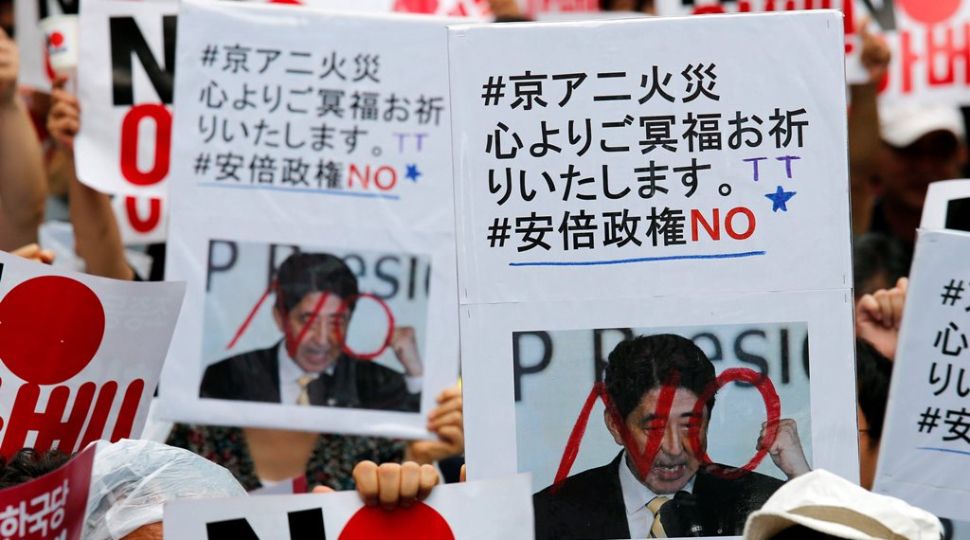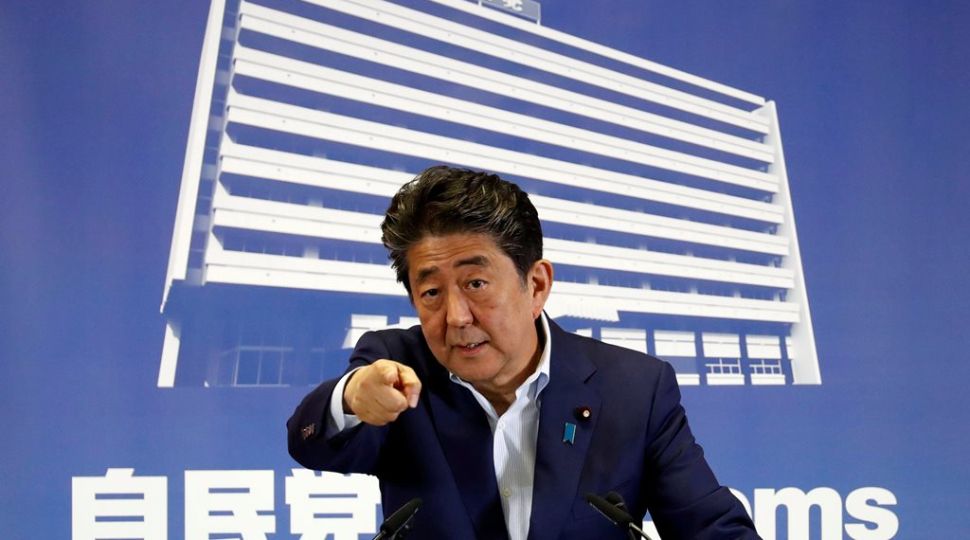Prospects for Russia-Japan Rapprochement

Japan and neither the Soviet Union nor its successor, the Russian Federation, have signed a peace treaty since the end of World War II because of the conflict over four of the Kuril Islands (Jap. “Northern Territories”). Both countries recognize the islands as their territory. During the Eastern Economic Forum (EEF) in Vladivostok (11-13 September this year), Russian President Vladimir Putin proposed to Japanese Prime Minister Shinzō Abe the signing of a peace treaty. The Japanese government rejected the proposal, conditioning it on the return of the Northern Territories. The leaders, however, announced the continuation of negotiations towards the conclusion of a peace treaty and deepening Russo-Japanese cooperation.
Small Steps Policy
Since Abe’s nomination for prime minister in 2012, Russia and Japan have intensified contacts at the highest level. The arrival of Abe to Vladivostok was his 23rd meeting with President Putin and third visit to the EEF. There, meetings in Osaka and Tokyo were announced for next year. From 2013, there have been consultations in a “2+2” format between the respective ministers of national defence and foreign affairs, as well as speakers of parliaments, economy ministers, parliamentarians and heads of General Staff and Security Councils.
As a result of the six-year-long negotiations, two proposals to resolve the conflict have been worked out. The Japanese proposal, “2+alpha”, assumes the transfer of the islands of Shikotan and Habomai (comprising 6% of the Kuril Islands land mass) to Japan, and negotiations on the transfer of Iturup and Kunashir. After obtaining the four islands, Japan is ready to sign a peace treaty and implement the “Abe Plan”, which includes Japanese investments in the Russian Far East. The Russian proposal, “hikiwake” (“a draw”, borrowed by Putin from judo terminology), offers the transfer of Shikotan and Habomai to Japan and the signing of the treaty. Then, the countries would deepen cooperation through existing meeting formats.
Although the proposals are different, the negotiations aid normalisation through a policy of “small steps”. The countries set up the Japan-Russia Intergovernmental Committee on Trade and Economic Issues and the Russia-Japan Investment Fund with a total of $1 billion. Japan created the position of Minister for Economic Cooperation with Russia and liberated the visa regime for Russians. Russia facilitates the entry of Japanese visitors to the graves of relatives on the Kurils, and in 2017, the states signed an agreement ending double taxation for companies from either country.
Obstacles to a Settlement
Resolution of the conflict is tied to social and political-military factors. In 2016, just 24% of Russians agreed the country should hand over the islands. Two weeks after the recent EEF, 75% of the Japanese declared that a peace treaty should be preceded by a permanent solution to the Kurils’ status.
The negotiations are also hampered by the sanctions on Russia. Japan did not recognize the annexation of Crimea and in 2014 joined the EU sanctions, which covered 89 people. Russia responded with a list of Japanese citizens banned from entry to Russian territory. As a result, the Kurils’ negotiations were halted for two years.
At the same time, the scope of the Japanese sanctions was limited and they were not respected. For example, the chairman of the Russian State Duma, Sergey Naryshkin, was allowed to enter Japan. Japanese companies have been taking part in Russian energy projects, ignoring the prohibition on cooperation with companies extracting oil from Arctic and offshore deposits. After the poison attack on Sergei Skripal and his daughter in Britain in March, Japan did not expel Russian diplomats, unlike many other countries.
The strategic-military significance for Russia of Iturup and Kunashir prevents their transfer to Japan. There is a base with about 3,500 Russian soldiers and fourth generation Su-35 fighter jets stationed there. In addition, a naval base is planned on the north of Matua Island in the Kurils. Above all, the Kurils allow Russia to expand its Anti-Access/Area Denial (A2AD) systems, already in place in the Kaliningrad region and Crimea. The systems hinder aggressors from carrying out military operations near Russia’s borders, strengthening the defence of its eastern coast and the security of its strategic nuclear forces.
Complementary Economies
Despite the poor prospects for signing a peace treaty now, both countries will deepen economic cooperation. Russia’s mining industry needs investment and new technology. Japan can supply both and is interested in turn in acquiring oil and LNG from Russia, comprising in the future 15-20% of the Japanese energy supply needs (currently 6% and 9%, respectively).
Japan owns shares of Russian mining projects, through which it receives oil (30% in Sakhalin-1) and LNG (22.5% in Sakhalin-2). It is also interested in participating in oil and gas projects in the Sea of Okhotsk (Magdan-1, 2, 3), the Vladivostok LNG terminal, and the Sakhalin-Hokkaido gas pipeline. It also receives oil through the Eastern Siberia-Pacific Ocean pipeline while the Chiyoda and Jogmec companies take part in the construction of the Yamal LNG. Novatek, responsible for Russia’s expansion in the LNG sector, signed a memorandum of understanding with Mitsui, Mitsubishi, Marubeni, and Jogmec on the development of the Arctic LNG-2 project and others. In addition, Japan’s Arctic policy assumes three areas of cooperation with Russia—research, the Northern Sea Route, and Yamal LNG.
During the EEF, Gazprom and Mitsui agreed on the construction of the Baltic LNG terminal in the port of Ust-Luga (Gulf of Finland) and announced the development of cooperation in the Baltic Sea, which may be joined by other Japanese companies.
Japan also provides financial support to Russian companies. The Japanese Bank for International Cooperation granted loans to Sberbank and Gazprom, which also is negotiating a yen-denominated bond with Japanese investors. Russian pipeline company Transneft has obtained funding from the Russia-Japan Fund, and equipment and technology from Japanese companies.
Conclusions and Perspectives
Over the next few years, regulating the final status of the Kuril Islands and the signing of a peace treaty is unlikely. By handing over Iturup and Kunashir, Russia would weaken its defence and military potential, which is one of its main assets in foreign policy.
Negotiations on the conclusion of a peace will continue, which was confirmed by Prime Minister Abe in his speech on 26 September during the UN General Assembly. The talks enable deepening the political and economic rapprochement, beneficial to both sides.
During the EEF, Abe and Putin announced the intensification of cooperation in the military domain. Probably, it will be limited to dialogue between the heads of the respective security forces and ministries without disturbing Japan’s cooperation with NATO and, all the more important, the US security guarantees. Japan is a member of the Alliance’s Partnership Interoperability Initiative, with deals with crisis operations, offers expert and political consultations, and supports NATO in Moldova, Georgia, Ukraine, Afghanistan, and elsewhere. At the same time, the Russian Vostok 2018 military manoeuvres and Russia’s plans to create a navy base in the Kurils show it wants to maintain military pressure on Japan. Moreover, the Russian A2/AD systems used on the Kurils means Japan has this in common with NATO countries neighbouring Kaliningrad, which expands the areas of cooperation between the Alliance and Japan.
Russo-Japanese rapprochement weakens the EU and US sanctions against Russia. Japanese companies, including state-owned ones, break the prohibitions, support Russia’s potential on the LNG market, and might be actors in Russia’s raw materials economy in countering the sanctions.
The signed contracts and MoU, as well as the granted loans, clearly show that Japanese banks and companies are enabling Russia to acquire new mining technology, which will increase its oil and gas extraction capacity. This is contrary to NATO and EU countries’ policy of restricting Russia’s access to new mining technology as one of their main instruments in restraining its aggression in Europe.
Map




